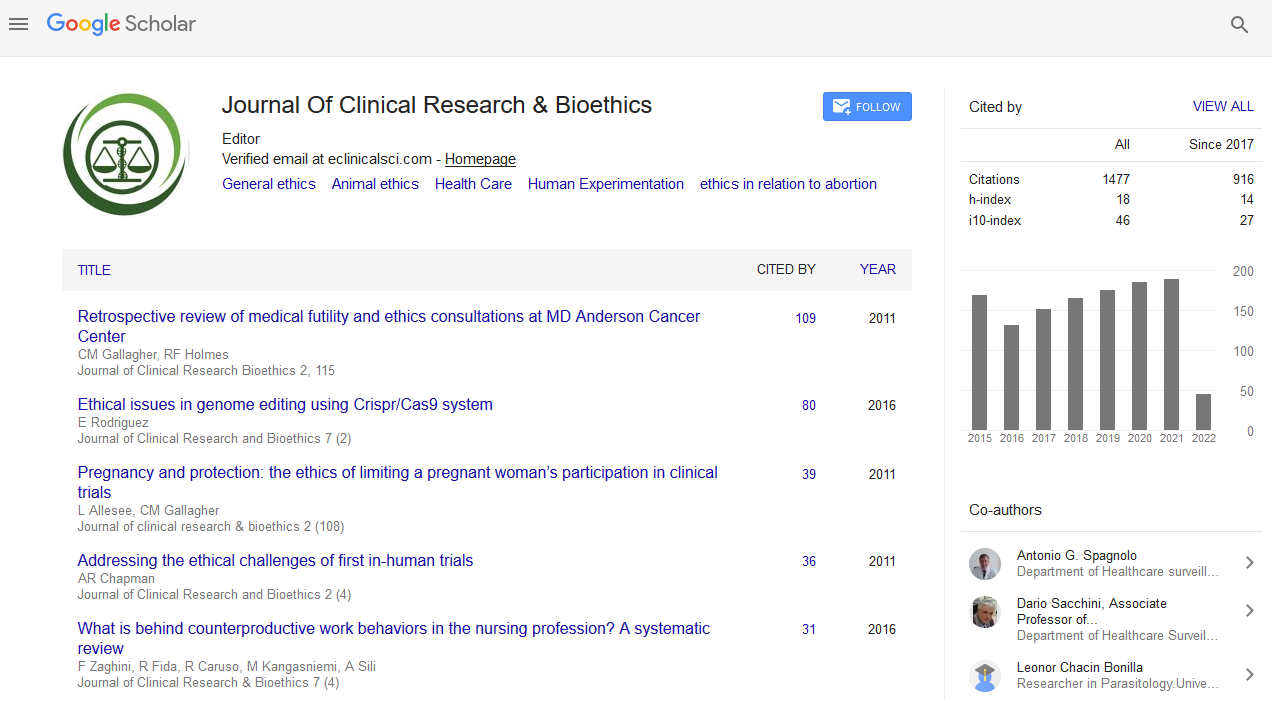PMC/PubMed Indexed Articles
Indexed In
- Open J Gate
- Genamics JournalSeek
- JournalTOCs
- RefSeek
- Hamdard University
- EBSCO A-Z
- OCLC- WorldCat
- Publons
- Geneva Foundation for Medical Education and Research
- Google Scholar
Useful Links
Share This Page
Journal Flyer

Open Access Journals
- Agri and Aquaculture
- Biochemistry
- Bioinformatics & Systems Biology
- Business & Management
- Chemistry
- Clinical Sciences
- Engineering
- Food & Nutrition
- General Science
- Genetics & Molecular Biology
- Immunology & Microbiology
- Medical Sciences
- Neuroscience & Psychology
- Nursing & Health Care
- Pharmaceutical Sciences
Clinical research in Mauritius: Myths and reality
3rd International Conference on Advanced Clinical Research and Clinical Trials
September 20-21, 2017 Dublin, Ireland
Mona Dawood, Laure Lam Hung, Anne-Solène Maria and Leroy Samy
Centre International de Développement Pharmaceutique, Mauritius
Scientific Tracks Abstracts: J Clin Res Bioeth
Abstract:
Midway between Africa and Asia, Mauritius is strategically located in the heart of the Indian Ocean. The economic growth of the island has been constant over the years, which enabled the country to be transformed from a dependent lowincome agriculture-based to an upper middle-income economy with significant growth in tourism, textile, healthcare, and energy and financial services sectors. Since its independence in 1968, the island enjoys significant political and social stability. Since 1980�??s, clinical research in Mauritius has been limited to small observational and population-based studies, often with a strictly national relevance. However, the establishment of a legal framework for clinical trials in 2011, governed by the Clinical Research Regulatory Council, boosted the interest of sponsors to conduct interventional trials.There are multiple advantages of conducting clinical trials in Mauritius. With a multi-ethnic population, it has sizeable and representative samples of Chinese, Indian, African ethnic populations with the same genetic traits. Moreover, the majority of Mauritians are literate and fluent in French and English. Mauritius is at an advanced stage in its epidemiological transition. Whilst communicable diseases and neonatality problems have diminished and are controlled effectively, non-communicable diseases are climbing. For example, with 23% of the population diagnosed with diabetes in 2015, representing more than 200,000 patients, Mauritius is an interesting source of potential participants in diabetes-related clinical trials. More epidemiological and interventional studies are needed to better understand health issues in Mauritius and develop effective treatments for this population. However, some investors may be reluctant to do so, because of the substantial ethical debate of conducting clinical research in developing countries, and fear that the quality and training of investigators and staff do not meet international standards. The aim of this presentation is to bring a light on these points and clarify myths and reality about clinical research in Mauritius.
Biography :
Mona Dawood is Head of the Pharmaceutical Operations & Regulatory Affairs for CIDP group. She completed her BSc (Hons) in Biomedical Chemistry from University of Warwick (UK) and Diploma in CRA from Sup-Santé, Paris, France. She joined CIDP seven years ago and has acquired a significant expertise in specific monitoring in various therapeutic areas (oncology, diabetes and pediatrics). She has also an excellent knowledge of the European & Asian regulations, regulatory aspects, claims validations, pharmacovigilance.


